TSE101FC: Technology Advancements Impacting Travel & Tourism Industry
VerifiedAdded on 2023/04/23
|13
|3001
|418
Report
AI Summary
This report investigates the technological advancements in the travel and tourism industry, focusing on the impact of Big Data and Artificial Intelligence (AI). It highlights how these technologies have revolutionized various aspects of the industry, from market research and customer experience to strategic marketing. The report provides definitions of Big Data and AI, explaining their roles in enhancing customer assistance, response times, and service delivery. It further elaborates on the benefits of Big Data, such as predicting trends and customer preferences, and AI applications, including chatbots and personalized travel assistance. The report also discusses the positive and negative implications of implementing Big Data and AI, considering factors like security concerns, the need for specialized expertise, and potential bugs in new technologies. The assessment brief for this report is TSE101FC Travel Systems Essentials.
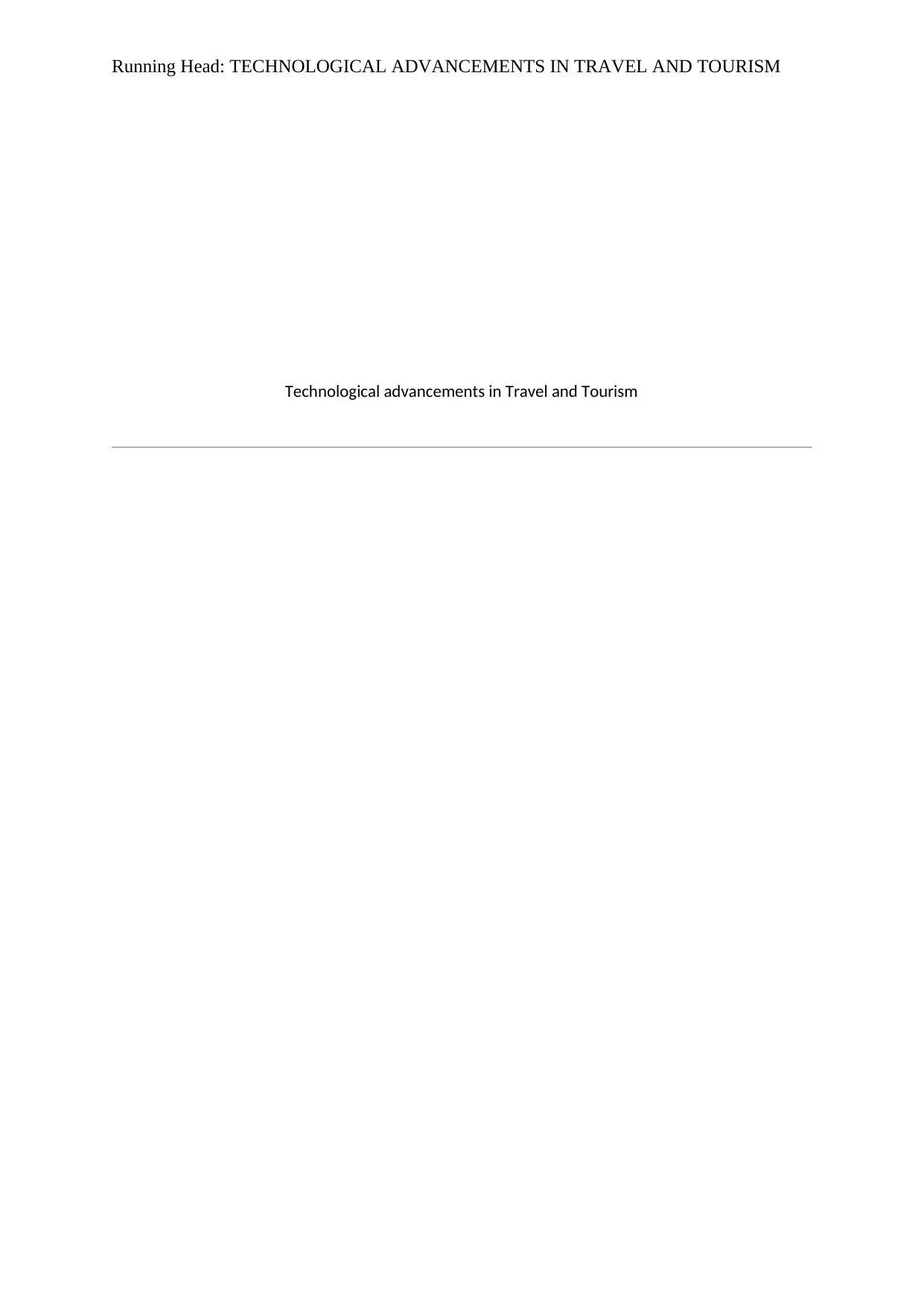
Running Head: TECHNOLOGICAL ADVANCEMENTS IN TRAVEL AND TOURISM
Technological advancements in Travel and Tourism
Technological advancements in Travel and Tourism
Paraphrase This Document
Need a fresh take? Get an instant paraphrase of this document with our AI Paraphraser
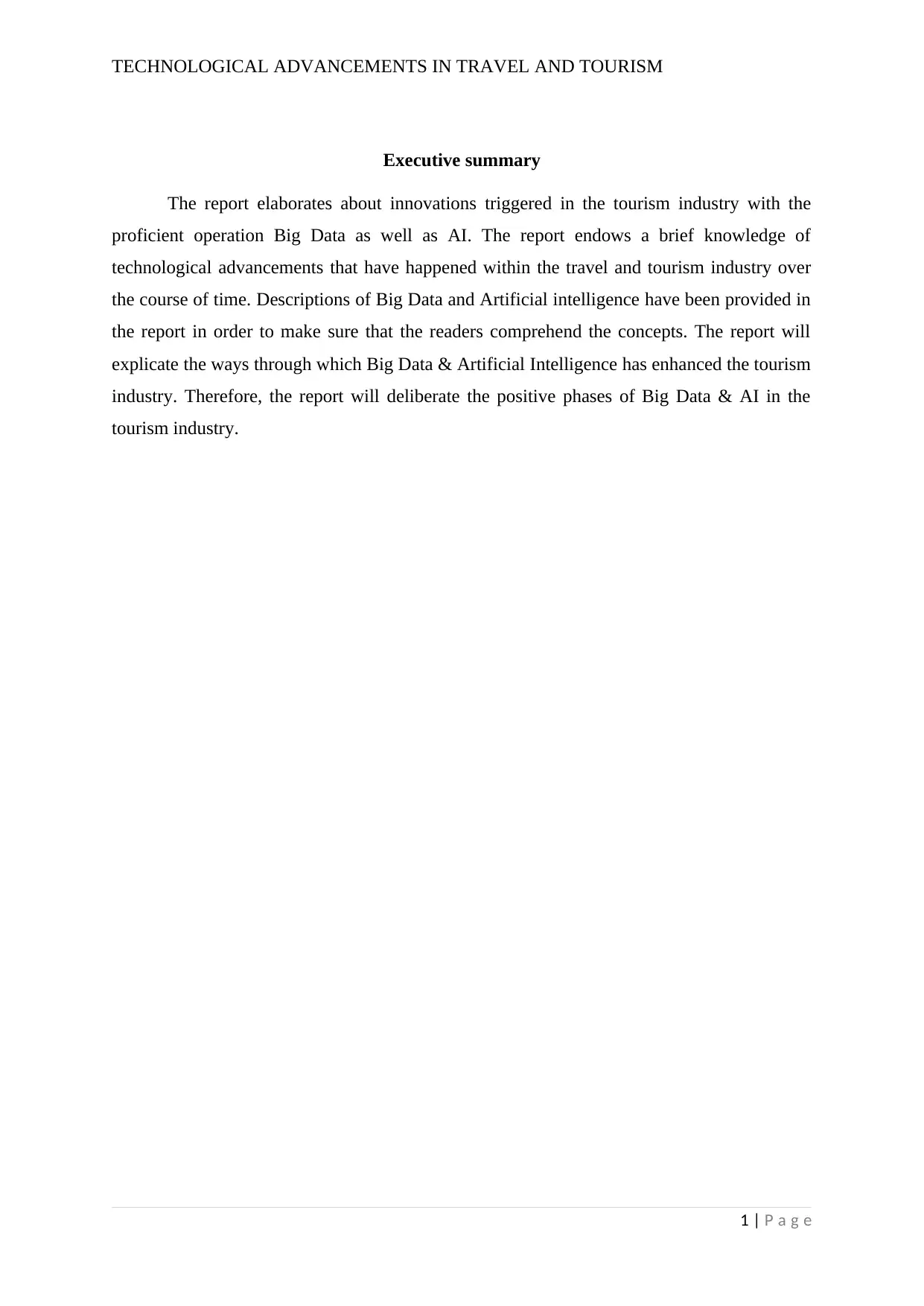
TECHNOLOGICAL ADVANCEMENTS IN TRAVEL AND TOURISM
Executive summary
The report elaborates about innovations triggered in the tourism industry with the
proficient operation Big Data as well as AI. The report endows a brief knowledge of
technological advancements that have happened within the travel and tourism industry over
the course of time. Descriptions of Big Data and Artificial intelligence have been provided in
the report in order to make sure that the readers comprehend the concepts. The report will
explicate the ways through which Big Data & Artificial Intelligence has enhanced the tourism
industry. Therefore, the report will deliberate the positive phases of Big Data & AI in the
tourism industry.
1 | P a g e
Executive summary
The report elaborates about innovations triggered in the tourism industry with the
proficient operation Big Data as well as AI. The report endows a brief knowledge of
technological advancements that have happened within the travel and tourism industry over
the course of time. Descriptions of Big Data and Artificial intelligence have been provided in
the report in order to make sure that the readers comprehend the concepts. The report will
explicate the ways through which Big Data & Artificial Intelligence has enhanced the tourism
industry. Therefore, the report will deliberate the positive phases of Big Data & AI in the
tourism industry.
1 | P a g e
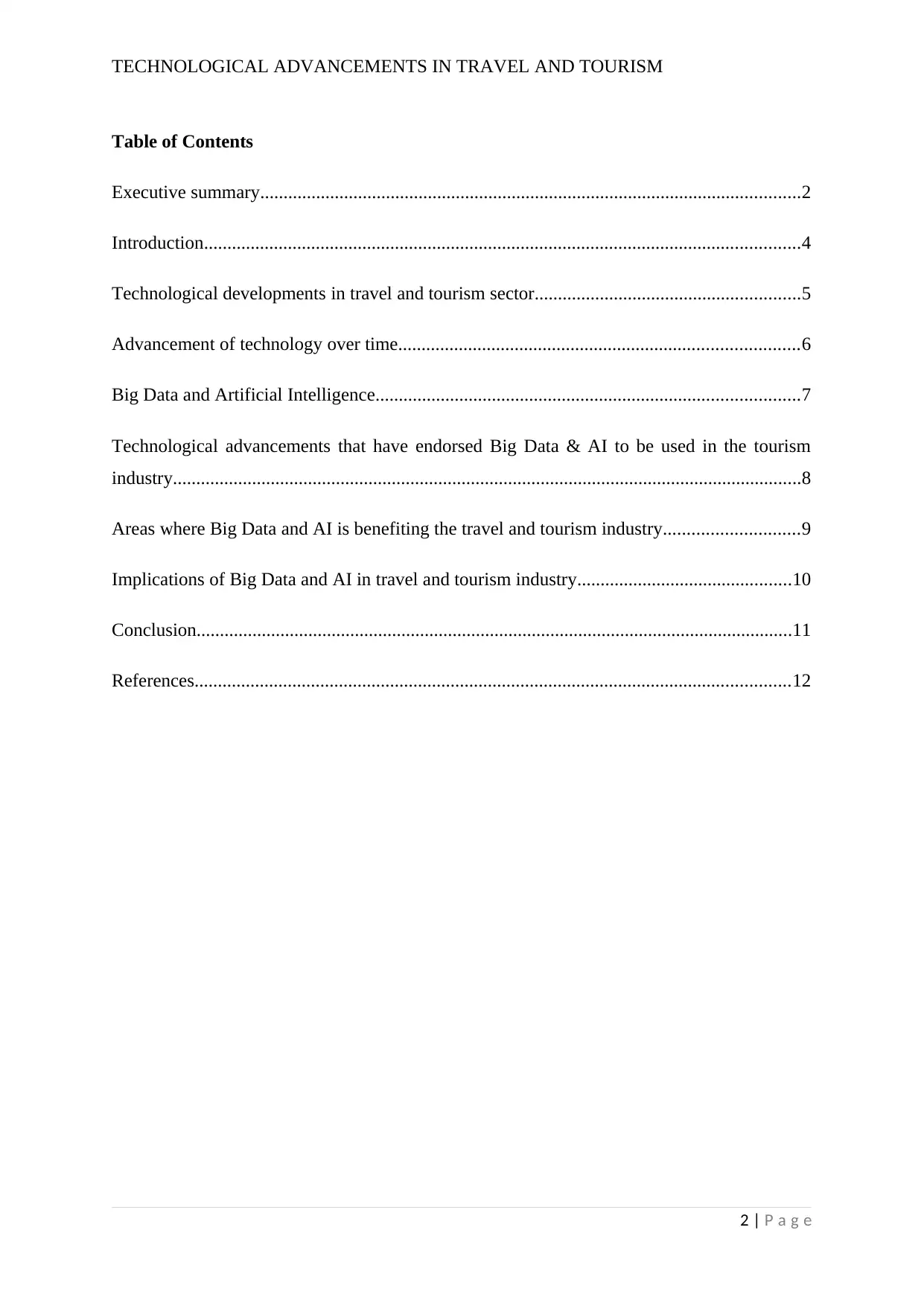
TECHNOLOGICAL ADVANCEMENTS IN TRAVEL AND TOURISM
Table of Contents
Executive summary....................................................................................................................2
Introduction................................................................................................................................4
Technological developments in travel and tourism sector.........................................................5
Advancement of technology over time......................................................................................6
Big Data and Artificial Intelligence...........................................................................................7
Technological advancements that have endorsed Big Data & AI to be used in the tourism
industry.......................................................................................................................................8
Areas where Big Data and AI is benefiting the travel and tourism industry.............................9
Implications of Big Data and AI in travel and tourism industry..............................................10
Conclusion................................................................................................................................11
References................................................................................................................................12
2 | P a g e
Table of Contents
Executive summary....................................................................................................................2
Introduction................................................................................................................................4
Technological developments in travel and tourism sector.........................................................5
Advancement of technology over time......................................................................................6
Big Data and Artificial Intelligence...........................................................................................7
Technological advancements that have endorsed Big Data & AI to be used in the tourism
industry.......................................................................................................................................8
Areas where Big Data and AI is benefiting the travel and tourism industry.............................9
Implications of Big Data and AI in travel and tourism industry..............................................10
Conclusion................................................................................................................................11
References................................................................................................................................12
2 | P a g e
⊘ This is a preview!⊘
Do you want full access?
Subscribe today to unlock all pages.

Trusted by 1+ million students worldwide
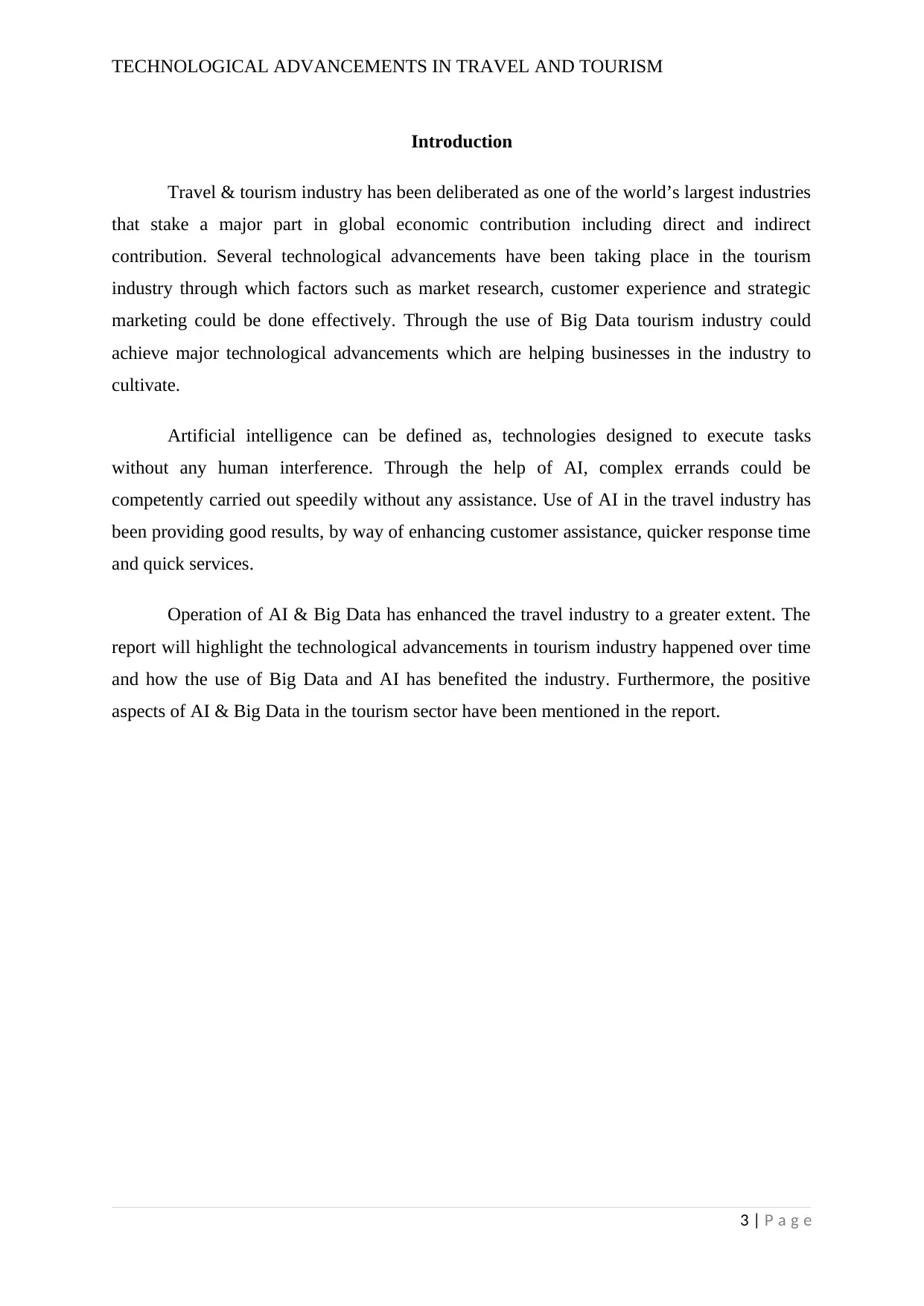
TECHNOLOGICAL ADVANCEMENTS IN TRAVEL AND TOURISM
Introduction
Travel & tourism industry has been deliberated as one of the world’s largest industries
that stake a major part in global economic contribution including direct and indirect
contribution. Several technological advancements have been taking place in the tourism
industry through which factors such as market research, customer experience and strategic
marketing could be done effectively. Through the use of Big Data tourism industry could
achieve major technological advancements which are helping businesses in the industry to
cultivate.
Artificial intelligence can be defined as, technologies designed to execute tasks
without any human interference. Through the help of AI, complex errands could be
competently carried out speedily without any assistance. Use of AI in the travel industry has
been providing good results, by way of enhancing customer assistance, quicker response time
and quick services.
Operation of AI & Big Data has enhanced the travel industry to a greater extent. The
report will highlight the technological advancements in tourism industry happened over time
and how the use of Big Data and AI has benefited the industry. Furthermore, the positive
aspects of AI & Big Data in the tourism sector have been mentioned in the report.
3 | P a g e
Introduction
Travel & tourism industry has been deliberated as one of the world’s largest industries
that stake a major part in global economic contribution including direct and indirect
contribution. Several technological advancements have been taking place in the tourism
industry through which factors such as market research, customer experience and strategic
marketing could be done effectively. Through the use of Big Data tourism industry could
achieve major technological advancements which are helping businesses in the industry to
cultivate.
Artificial intelligence can be defined as, technologies designed to execute tasks
without any human interference. Through the help of AI, complex errands could be
competently carried out speedily without any assistance. Use of AI in the travel industry has
been providing good results, by way of enhancing customer assistance, quicker response time
and quick services.
Operation of AI & Big Data has enhanced the travel industry to a greater extent. The
report will highlight the technological advancements in tourism industry happened over time
and how the use of Big Data and AI has benefited the industry. Furthermore, the positive
aspects of AI & Big Data in the tourism sector have been mentioned in the report.
3 | P a g e
Paraphrase This Document
Need a fresh take? Get an instant paraphrase of this document with our AI Paraphraser
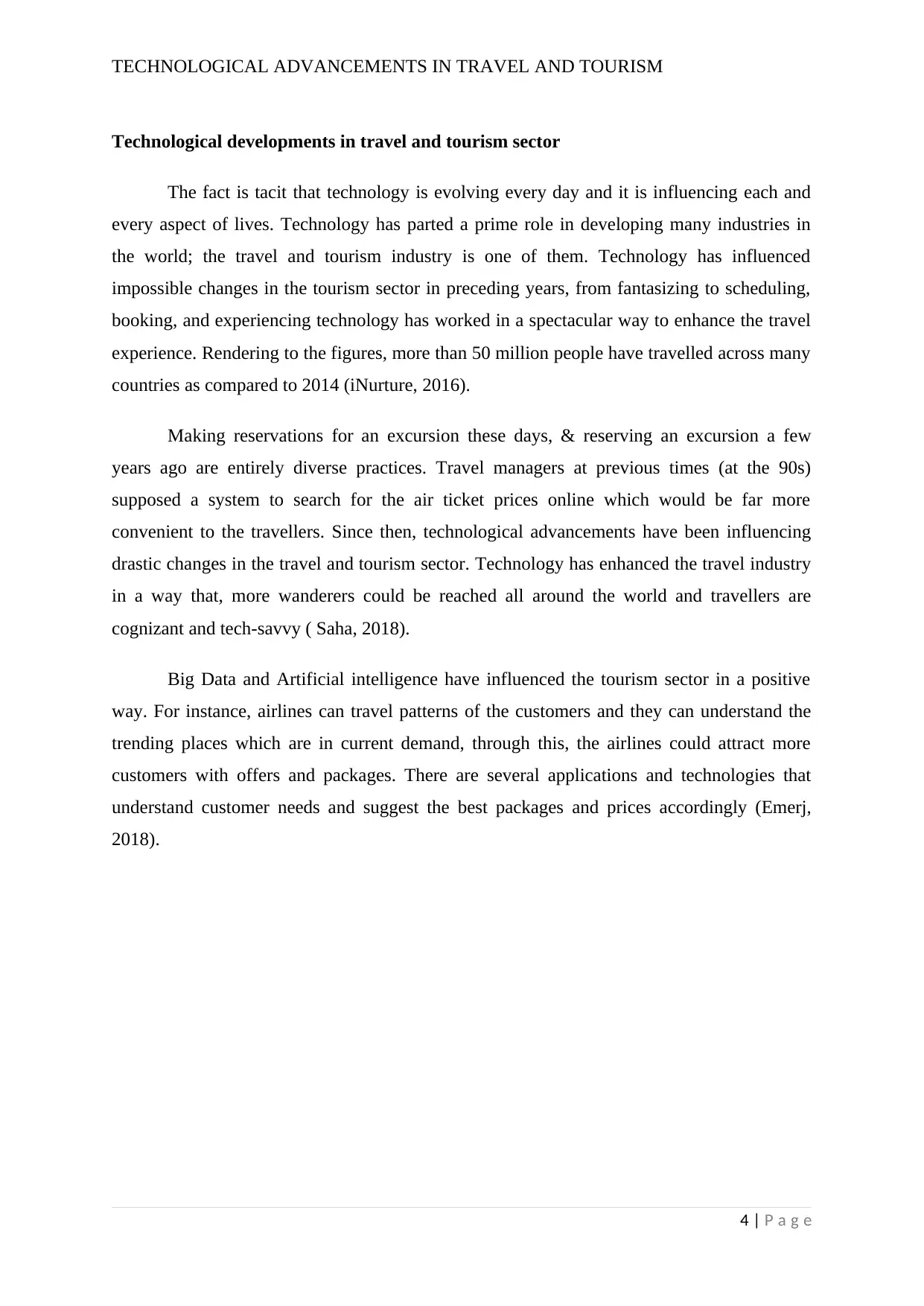
TECHNOLOGICAL ADVANCEMENTS IN TRAVEL AND TOURISM
Technological developments in travel and tourism sector
The fact is tacit that technology is evolving every day and it is influencing each and
every aspect of lives. Technology has parted a prime role in developing many industries in
the world; the travel and tourism industry is one of them. Technology has influenced
impossible changes in the tourism sector in preceding years, from fantasizing to scheduling,
booking, and experiencing technology has worked in a spectacular way to enhance the travel
experience. Rendering to the figures, more than 50 million people have travelled across many
countries as compared to 2014 (iNurture, 2016).
Making reservations for an excursion these days, & reserving an excursion a few
years ago are entirely diverse practices. Travel managers at previous times (at the 90s)
supposed a system to search for the air ticket prices online which would be far more
convenient to the travellers. Since then, technological advancements have been influencing
drastic changes in the travel and tourism sector. Technology has enhanced the travel industry
in a way that, more wanderers could be reached all around the world and travellers are
cognizant and tech-savvy ( Saha, 2018).
Big Data and Artificial intelligence have influenced the tourism sector in a positive
way. For instance, airlines can travel patterns of the customers and they can understand the
trending places which are in current demand, through this, the airlines could attract more
customers with offers and packages. There are several applications and technologies that
understand customer needs and suggest the best packages and prices accordingly (Emerj,
2018).
4 | P a g e
Technological developments in travel and tourism sector
The fact is tacit that technology is evolving every day and it is influencing each and
every aspect of lives. Technology has parted a prime role in developing many industries in
the world; the travel and tourism industry is one of them. Technology has influenced
impossible changes in the tourism sector in preceding years, from fantasizing to scheduling,
booking, and experiencing technology has worked in a spectacular way to enhance the travel
experience. Rendering to the figures, more than 50 million people have travelled across many
countries as compared to 2014 (iNurture, 2016).
Making reservations for an excursion these days, & reserving an excursion a few
years ago are entirely diverse practices. Travel managers at previous times (at the 90s)
supposed a system to search for the air ticket prices online which would be far more
convenient to the travellers. Since then, technological advancements have been influencing
drastic changes in the travel and tourism sector. Technology has enhanced the travel industry
in a way that, more wanderers could be reached all around the world and travellers are
cognizant and tech-savvy ( Saha, 2018).
Big Data and Artificial intelligence have influenced the tourism sector in a positive
way. For instance, airlines can travel patterns of the customers and they can understand the
trending places which are in current demand, through this, the airlines could attract more
customers with offers and packages. There are several applications and technologies that
understand customer needs and suggest the best packages and prices accordingly (Emerj,
2018).
4 | P a g e
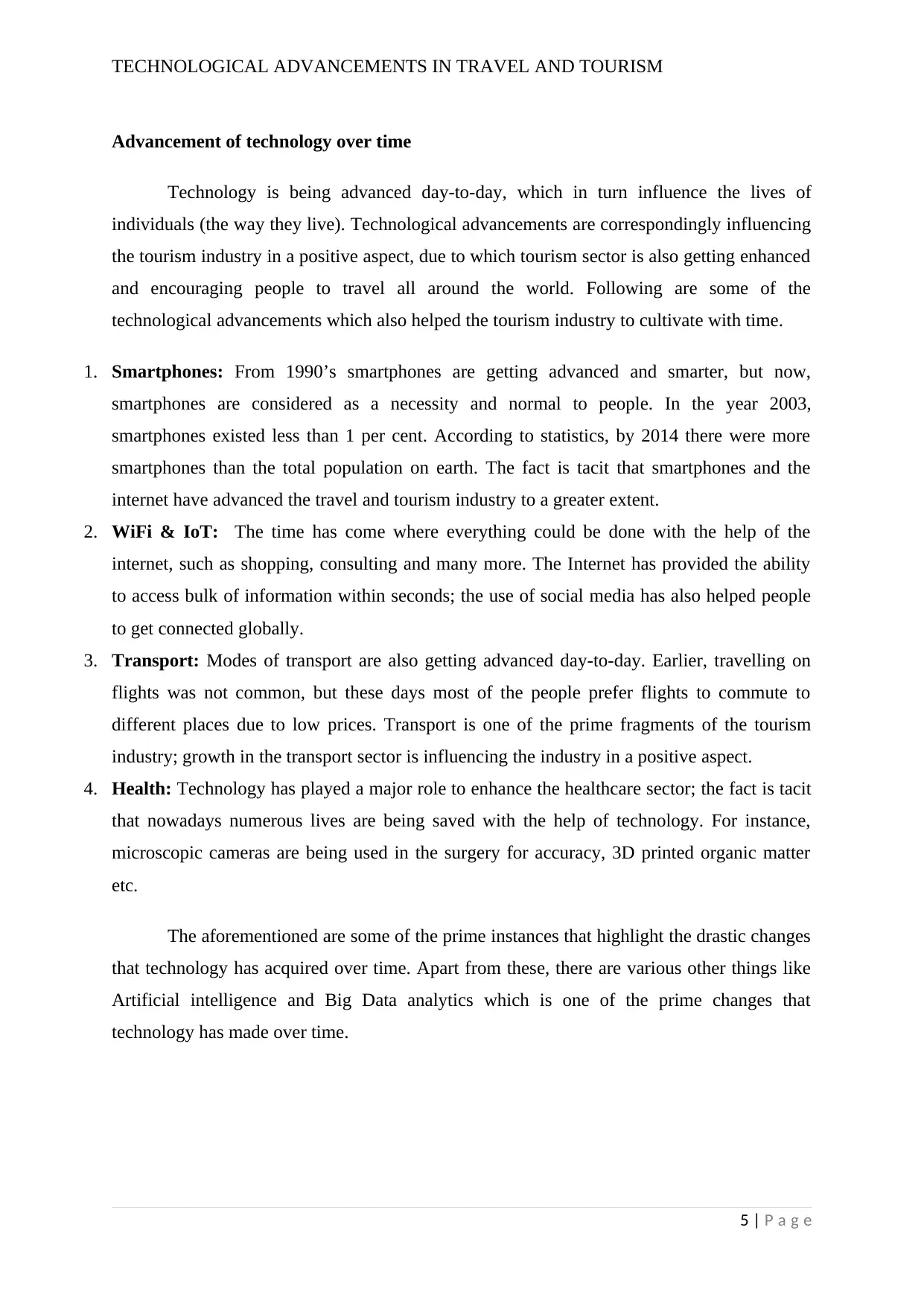
TECHNOLOGICAL ADVANCEMENTS IN TRAVEL AND TOURISM
Advancement of technology over time
Technology is being advanced day-to-day, which in turn influence the lives of
individuals (the way they live). Technological advancements are correspondingly influencing
the tourism industry in a positive aspect, due to which tourism sector is also getting enhanced
and encouraging people to travel all around the world. Following are some of the
technological advancements which also helped the tourism industry to cultivate with time.
1. Smartphones: From 1990’s smartphones are getting advanced and smarter, but now,
smartphones are considered as a necessity and normal to people. In the year 2003,
smartphones existed less than 1 per cent. According to statistics, by 2014 there were more
smartphones than the total population on earth. The fact is tacit that smartphones and the
internet have advanced the travel and tourism industry to a greater extent.
2. WiFi & IoT: The time has come where everything could be done with the help of the
internet, such as shopping, consulting and many more. The Internet has provided the ability
to access bulk of information within seconds; the use of social media has also helped people
to get connected globally.
3. Transport: Modes of transport are also getting advanced day-to-day. Earlier, travelling on
flights was not common, but these days most of the people prefer flights to commute to
different places due to low prices. Transport is one of the prime fragments of the tourism
industry; growth in the transport sector is influencing the industry in a positive aspect.
4. Health: Technology has played a major role to enhance the healthcare sector; the fact is tacit
that nowadays numerous lives are being saved with the help of technology. For instance,
microscopic cameras are being used in the surgery for accuracy, 3D printed organic matter
etc.
The aforementioned are some of the prime instances that highlight the drastic changes
that technology has acquired over time. Apart from these, there are various other things like
Artificial intelligence and Big Data analytics which is one of the prime changes that
technology has made over time.
5 | P a g e
Advancement of technology over time
Technology is being advanced day-to-day, which in turn influence the lives of
individuals (the way they live). Technological advancements are correspondingly influencing
the tourism industry in a positive aspect, due to which tourism sector is also getting enhanced
and encouraging people to travel all around the world. Following are some of the
technological advancements which also helped the tourism industry to cultivate with time.
1. Smartphones: From 1990’s smartphones are getting advanced and smarter, but now,
smartphones are considered as a necessity and normal to people. In the year 2003,
smartphones existed less than 1 per cent. According to statistics, by 2014 there were more
smartphones than the total population on earth. The fact is tacit that smartphones and the
internet have advanced the travel and tourism industry to a greater extent.
2. WiFi & IoT: The time has come where everything could be done with the help of the
internet, such as shopping, consulting and many more. The Internet has provided the ability
to access bulk of information within seconds; the use of social media has also helped people
to get connected globally.
3. Transport: Modes of transport are also getting advanced day-to-day. Earlier, travelling on
flights was not common, but these days most of the people prefer flights to commute to
different places due to low prices. Transport is one of the prime fragments of the tourism
industry; growth in the transport sector is influencing the industry in a positive aspect.
4. Health: Technology has played a major role to enhance the healthcare sector; the fact is tacit
that nowadays numerous lives are being saved with the help of technology. For instance,
microscopic cameras are being used in the surgery for accuracy, 3D printed organic matter
etc.
The aforementioned are some of the prime instances that highlight the drastic changes
that technology has acquired over time. Apart from these, there are various other things like
Artificial intelligence and Big Data analytics which is one of the prime changes that
technology has made over time.
5 | P a g e
⊘ This is a preview!⊘
Do you want full access?
Subscribe today to unlock all pages.

Trusted by 1+ million students worldwide
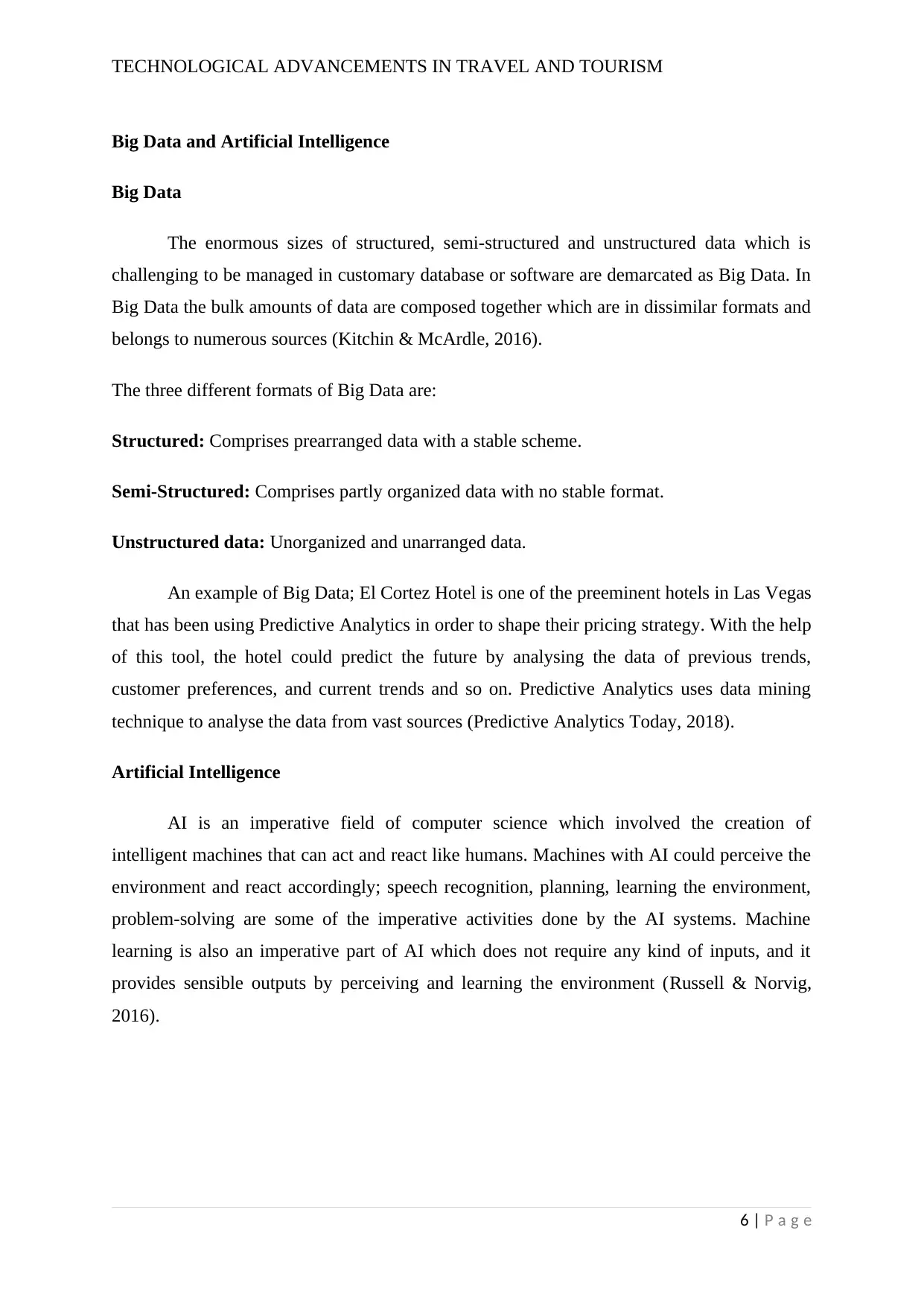
TECHNOLOGICAL ADVANCEMENTS IN TRAVEL AND TOURISM
Big Data and Artificial Intelligence
Big Data
The enormous sizes of structured, semi-structured and unstructured data which is
challenging to be managed in customary database or software are demarcated as Big Data. In
Big Data the bulk amounts of data are composed together which are in dissimilar formats and
belongs to numerous sources (Kitchin & McArdle, 2016).
The three different formats of Big Data are:
Structured: Comprises prearranged data with a stable scheme.
Semi-Structured: Comprises partly organized data with no stable format.
Unstructured data: Unorganized and unarranged data.
An example of Big Data; El Cortez Hotel is one of the preeminent hotels in Las Vegas
that has been using Predictive Analytics in order to shape their pricing strategy. With the help
of this tool, the hotel could predict the future by analysing the data of previous trends,
customer preferences, and current trends and so on. Predictive Analytics uses data mining
technique to analyse the data from vast sources (Predictive Analytics Today, 2018).
Artificial Intelligence
AI is an imperative field of computer science which involved the creation of
intelligent machines that can act and react like humans. Machines with AI could perceive the
environment and react accordingly; speech recognition, planning, learning the environment,
problem-solving are some of the imperative activities done by the AI systems. Machine
learning is also an imperative part of AI which does not require any kind of inputs, and it
provides sensible outputs by perceiving and learning the environment (Russell & Norvig,
2016).
6 | P a g e
Big Data and Artificial Intelligence
Big Data
The enormous sizes of structured, semi-structured and unstructured data which is
challenging to be managed in customary database or software are demarcated as Big Data. In
Big Data the bulk amounts of data are composed together which are in dissimilar formats and
belongs to numerous sources (Kitchin & McArdle, 2016).
The three different formats of Big Data are:
Structured: Comprises prearranged data with a stable scheme.
Semi-Structured: Comprises partly organized data with no stable format.
Unstructured data: Unorganized and unarranged data.
An example of Big Data; El Cortez Hotel is one of the preeminent hotels in Las Vegas
that has been using Predictive Analytics in order to shape their pricing strategy. With the help
of this tool, the hotel could predict the future by analysing the data of previous trends,
customer preferences, and current trends and so on. Predictive Analytics uses data mining
technique to analyse the data from vast sources (Predictive Analytics Today, 2018).
Artificial Intelligence
AI is an imperative field of computer science which involved the creation of
intelligent machines that can act and react like humans. Machines with AI could perceive the
environment and react accordingly; speech recognition, planning, learning the environment,
problem-solving are some of the imperative activities done by the AI systems. Machine
learning is also an imperative part of AI which does not require any kind of inputs, and it
provides sensible outputs by perceiving and learning the environment (Russell & Norvig,
2016).
6 | P a g e
Paraphrase This Document
Need a fresh take? Get an instant paraphrase of this document with our AI Paraphraser
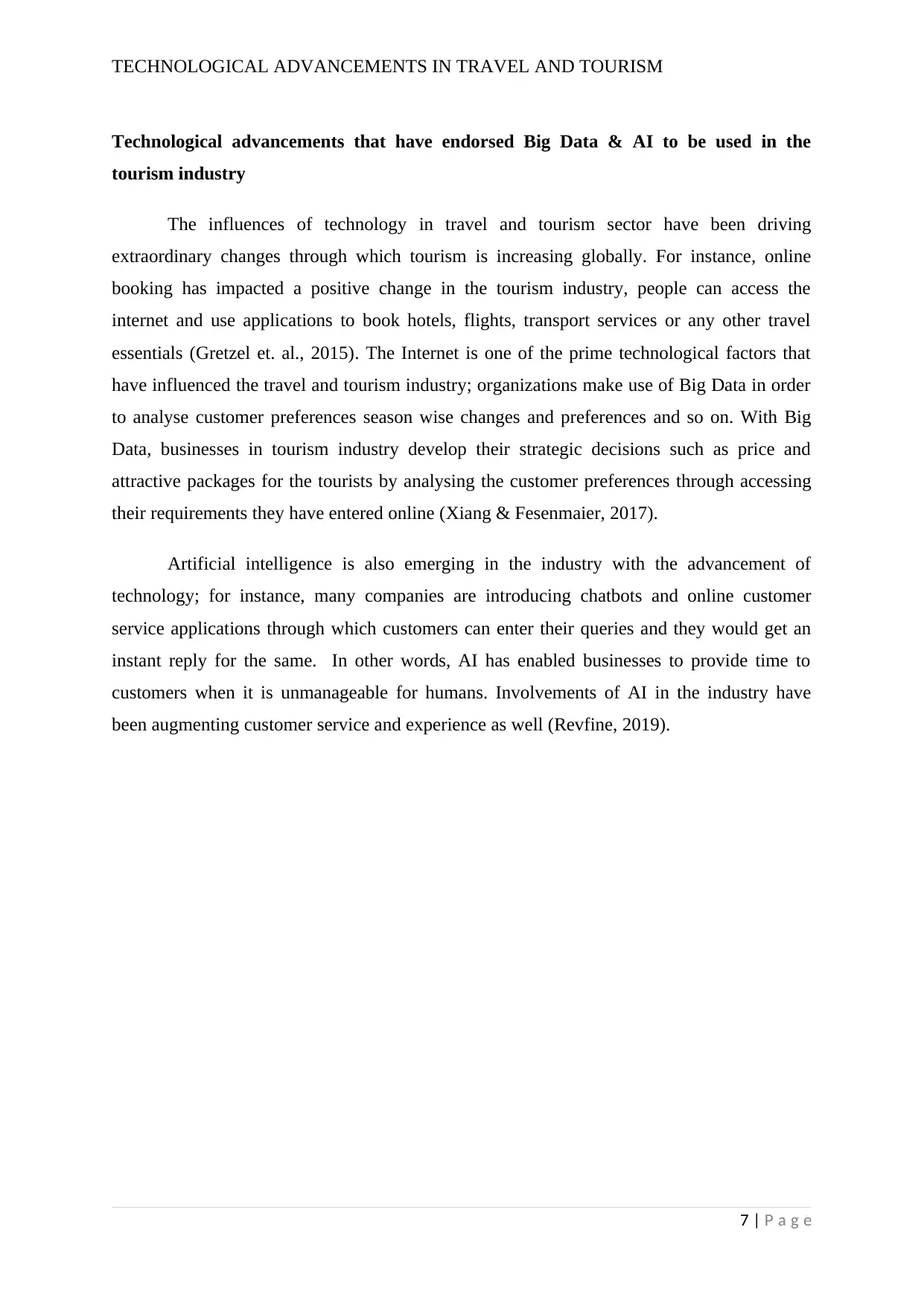
TECHNOLOGICAL ADVANCEMENTS IN TRAVEL AND TOURISM
Technological advancements that have endorsed Big Data & AI to be used in the
tourism industry
The influences of technology in travel and tourism sector have been driving
extraordinary changes through which tourism is increasing globally. For instance, online
booking has impacted a positive change in the tourism industry, people can access the
internet and use applications to book hotels, flights, transport services or any other travel
essentials (Gretzel et. al., 2015). The Internet is one of the prime technological factors that
have influenced the travel and tourism industry; organizations make use of Big Data in order
to analyse customer preferences season wise changes and preferences and so on. With Big
Data, businesses in tourism industry develop their strategic decisions such as price and
attractive packages for the tourists by analysing the customer preferences through accessing
their requirements they have entered online (Xiang & Fesenmaier, 2017).
Artificial intelligence is also emerging in the industry with the advancement of
technology; for instance, many companies are introducing chatbots and online customer
service applications through which customers can enter their queries and they would get an
instant reply for the same. In other words, AI has enabled businesses to provide time to
customers when it is unmanageable for humans. Involvements of AI in the industry have
been augmenting customer service and experience as well (Revfine, 2019).
7 | P a g e
Technological advancements that have endorsed Big Data & AI to be used in the
tourism industry
The influences of technology in travel and tourism sector have been driving
extraordinary changes through which tourism is increasing globally. For instance, online
booking has impacted a positive change in the tourism industry, people can access the
internet and use applications to book hotels, flights, transport services or any other travel
essentials (Gretzel et. al., 2015). The Internet is one of the prime technological factors that
have influenced the travel and tourism industry; organizations make use of Big Data in order
to analyse customer preferences season wise changes and preferences and so on. With Big
Data, businesses in tourism industry develop their strategic decisions such as price and
attractive packages for the tourists by analysing the customer preferences through accessing
their requirements they have entered online (Xiang & Fesenmaier, 2017).
Artificial intelligence is also emerging in the industry with the advancement of
technology; for instance, many companies are introducing chatbots and online customer
service applications through which customers can enter their queries and they would get an
instant reply for the same. In other words, AI has enabled businesses to provide time to
customers when it is unmanageable for humans. Involvements of AI in the industry have
been augmenting customer service and experience as well (Revfine, 2019).
7 | P a g e
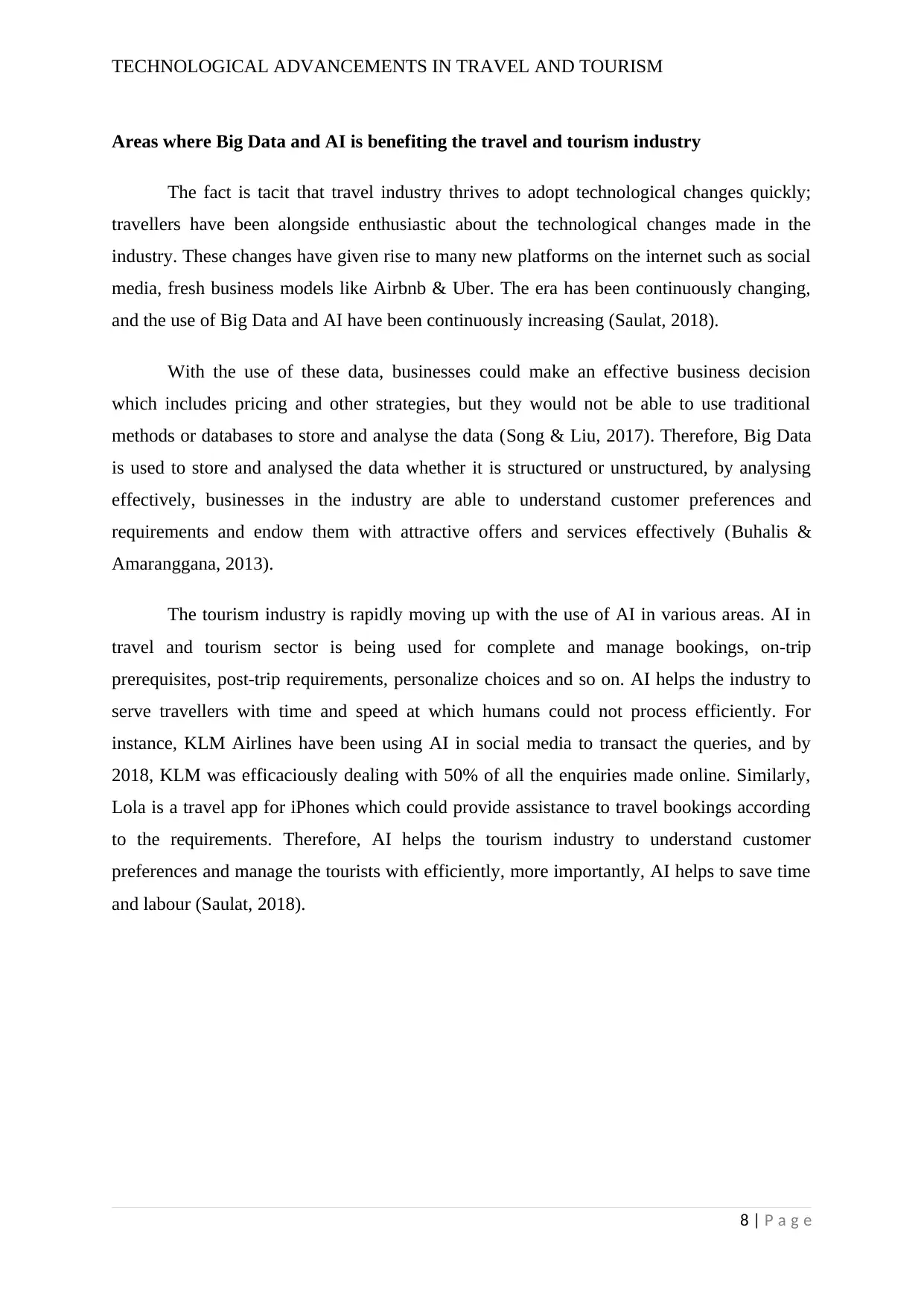
TECHNOLOGICAL ADVANCEMENTS IN TRAVEL AND TOURISM
Areas where Big Data and AI is benefiting the travel and tourism industry
The fact is tacit that travel industry thrives to adopt technological changes quickly;
travellers have been alongside enthusiastic about the technological changes made in the
industry. These changes have given rise to many new platforms on the internet such as social
media, fresh business models like Airbnb & Uber. The era has been continuously changing,
and the use of Big Data and AI have been continuously increasing (Saulat, 2018).
With the use of these data, businesses could make an effective business decision
which includes pricing and other strategies, but they would not be able to use traditional
methods or databases to store and analyse the data (Song & Liu, 2017). Therefore, Big Data
is used to store and analysed the data whether it is structured or unstructured, by analysing
effectively, businesses in the industry are able to understand customer preferences and
requirements and endow them with attractive offers and services effectively (Buhalis &
Amaranggana, 2013).
The tourism industry is rapidly moving up with the use of AI in various areas. AI in
travel and tourism sector is being used for complete and manage bookings, on-trip
prerequisites, post-trip requirements, personalize choices and so on. AI helps the industry to
serve travellers with time and speed at which humans could not process efficiently. For
instance, KLM Airlines have been using AI in social media to transact the queries, and by
2018, KLM was efficaciously dealing with 50% of all the enquiries made online. Similarly,
Lola is a travel app for iPhones which could provide assistance to travel bookings according
to the requirements. Therefore, AI helps the tourism industry to understand customer
preferences and manage the tourists with efficiently, more importantly, AI helps to save time
and labour (Saulat, 2018).
8 | P a g e
Areas where Big Data and AI is benefiting the travel and tourism industry
The fact is tacit that travel industry thrives to adopt technological changes quickly;
travellers have been alongside enthusiastic about the technological changes made in the
industry. These changes have given rise to many new platforms on the internet such as social
media, fresh business models like Airbnb & Uber. The era has been continuously changing,
and the use of Big Data and AI have been continuously increasing (Saulat, 2018).
With the use of these data, businesses could make an effective business decision
which includes pricing and other strategies, but they would not be able to use traditional
methods or databases to store and analyse the data (Song & Liu, 2017). Therefore, Big Data
is used to store and analysed the data whether it is structured or unstructured, by analysing
effectively, businesses in the industry are able to understand customer preferences and
requirements and endow them with attractive offers and services effectively (Buhalis &
Amaranggana, 2013).
The tourism industry is rapidly moving up with the use of AI in various areas. AI in
travel and tourism sector is being used for complete and manage bookings, on-trip
prerequisites, post-trip requirements, personalize choices and so on. AI helps the industry to
serve travellers with time and speed at which humans could not process efficiently. For
instance, KLM Airlines have been using AI in social media to transact the queries, and by
2018, KLM was efficaciously dealing with 50% of all the enquiries made online. Similarly,
Lola is a travel app for iPhones which could provide assistance to travel bookings according
to the requirements. Therefore, AI helps the tourism industry to understand customer
preferences and manage the tourists with efficiently, more importantly, AI helps to save time
and labour (Saulat, 2018).
8 | P a g e
⊘ This is a preview!⊘
Do you want full access?
Subscribe today to unlock all pages.

Trusted by 1+ million students worldwide
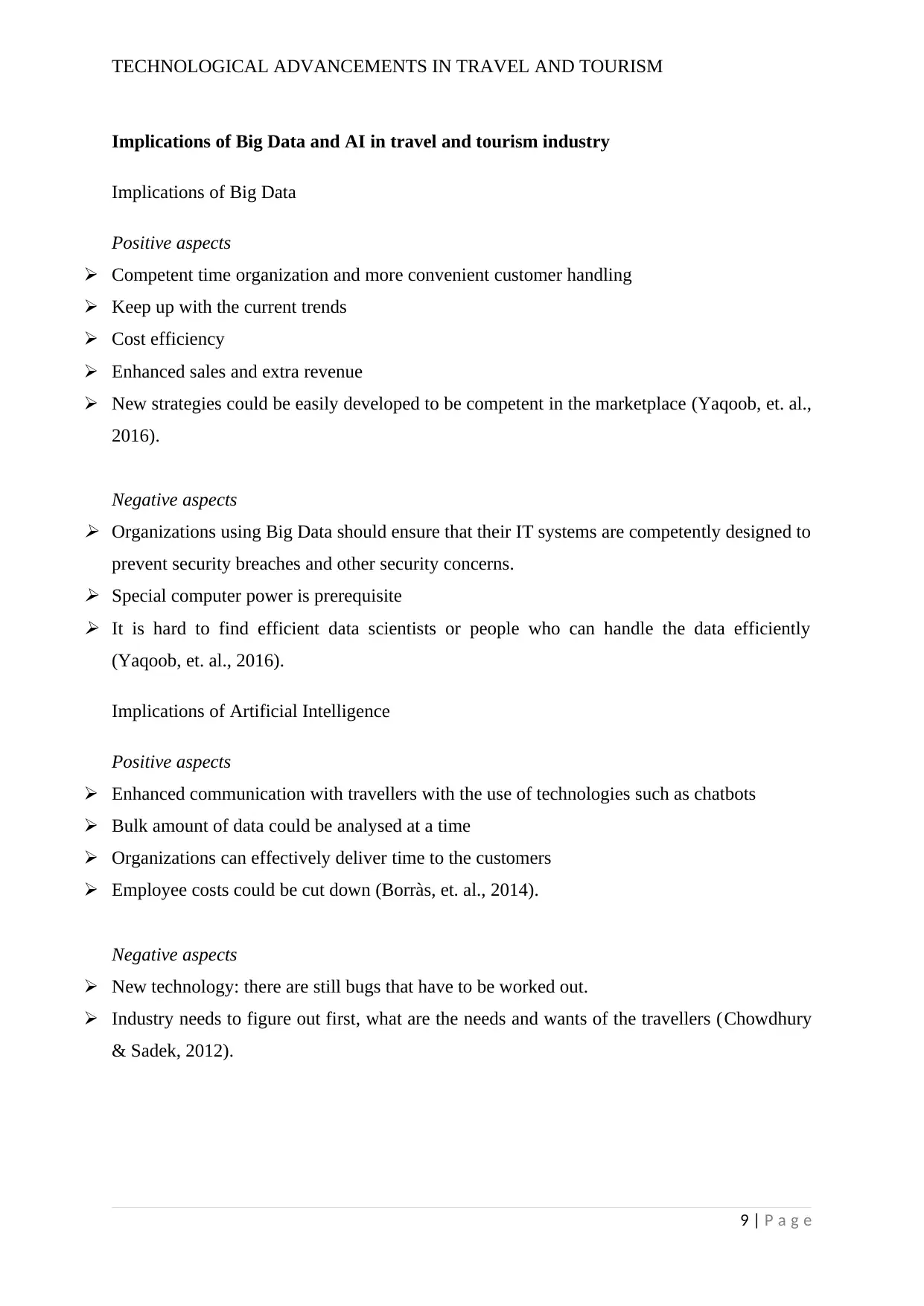
TECHNOLOGICAL ADVANCEMENTS IN TRAVEL AND TOURISM
Implications of Big Data and AI in travel and tourism industry
Implications of Big Data
Positive aspects
Competent time organization and more convenient customer handling
Keep up with the current trends
Cost efficiency
Enhanced sales and extra revenue
New strategies could be easily developed to be competent in the marketplace (Yaqoob, et. al.,
2016).
Negative aspects
Organizations using Big Data should ensure that their IT systems are competently designed to
prevent security breaches and other security concerns.
Special computer power is prerequisite
It is hard to find efficient data scientists or people who can handle the data efficiently
(Yaqoob, et. al., 2016).
Implications of Artificial Intelligence
Positive aspects
Enhanced communication with travellers with the use of technologies such as chatbots
Bulk amount of data could be analysed at a time
Organizations can effectively deliver time to the customers
Employee costs could be cut down (Borràs, et. al., 2014).
Negative aspects
New technology: there are still bugs that have to be worked out.
Industry needs to figure out first, what are the needs and wants of the travellers (Chowdhury
& Sadek, 2012).
9 | P a g e
Implications of Big Data and AI in travel and tourism industry
Implications of Big Data
Positive aspects
Competent time organization and more convenient customer handling
Keep up with the current trends
Cost efficiency
Enhanced sales and extra revenue
New strategies could be easily developed to be competent in the marketplace (Yaqoob, et. al.,
2016).
Negative aspects
Organizations using Big Data should ensure that their IT systems are competently designed to
prevent security breaches and other security concerns.
Special computer power is prerequisite
It is hard to find efficient data scientists or people who can handle the data efficiently
(Yaqoob, et. al., 2016).
Implications of Artificial Intelligence
Positive aspects
Enhanced communication with travellers with the use of technologies such as chatbots
Bulk amount of data could be analysed at a time
Organizations can effectively deliver time to the customers
Employee costs could be cut down (Borràs, et. al., 2014).
Negative aspects
New technology: there are still bugs that have to be worked out.
Industry needs to figure out first, what are the needs and wants of the travellers (Chowdhury
& Sadek, 2012).
9 | P a g e
Paraphrase This Document
Need a fresh take? Get an instant paraphrase of this document with our AI Paraphraser
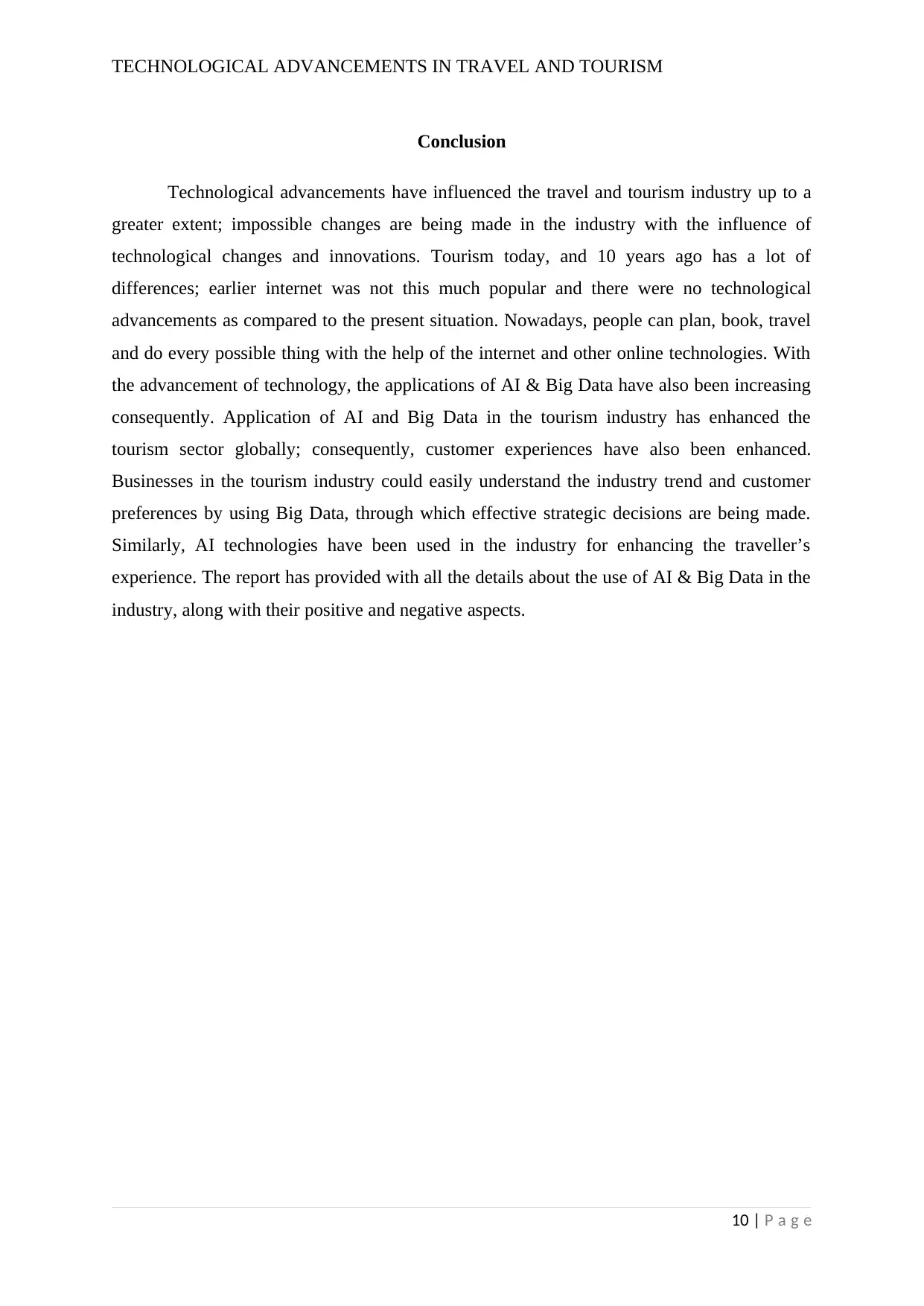
TECHNOLOGICAL ADVANCEMENTS IN TRAVEL AND TOURISM
Conclusion
Technological advancements have influenced the travel and tourism industry up to a
greater extent; impossible changes are being made in the industry with the influence of
technological changes and innovations. Tourism today, and 10 years ago has a lot of
differences; earlier internet was not this much popular and there were no technological
advancements as compared to the present situation. Nowadays, people can plan, book, travel
and do every possible thing with the help of the internet and other online technologies. With
the advancement of technology, the applications of AI & Big Data have also been increasing
consequently. Application of AI and Big Data in the tourism industry has enhanced the
tourism sector globally; consequently, customer experiences have also been enhanced.
Businesses in the tourism industry could easily understand the industry trend and customer
preferences by using Big Data, through which effective strategic decisions are being made.
Similarly, AI technologies have been used in the industry for enhancing the traveller’s
experience. The report has provided with all the details about the use of AI & Big Data in the
industry, along with their positive and negative aspects.
10 | P a g e
Conclusion
Technological advancements have influenced the travel and tourism industry up to a
greater extent; impossible changes are being made in the industry with the influence of
technological changes and innovations. Tourism today, and 10 years ago has a lot of
differences; earlier internet was not this much popular and there were no technological
advancements as compared to the present situation. Nowadays, people can plan, book, travel
and do every possible thing with the help of the internet and other online technologies. With
the advancement of technology, the applications of AI & Big Data have also been increasing
consequently. Application of AI and Big Data in the tourism industry has enhanced the
tourism sector globally; consequently, customer experiences have also been enhanced.
Businesses in the tourism industry could easily understand the industry trend and customer
preferences by using Big Data, through which effective strategic decisions are being made.
Similarly, AI technologies have been used in the industry for enhancing the traveller’s
experience. The report has provided with all the details about the use of AI & Big Data in the
industry, along with their positive and negative aspects.
10 | P a g e
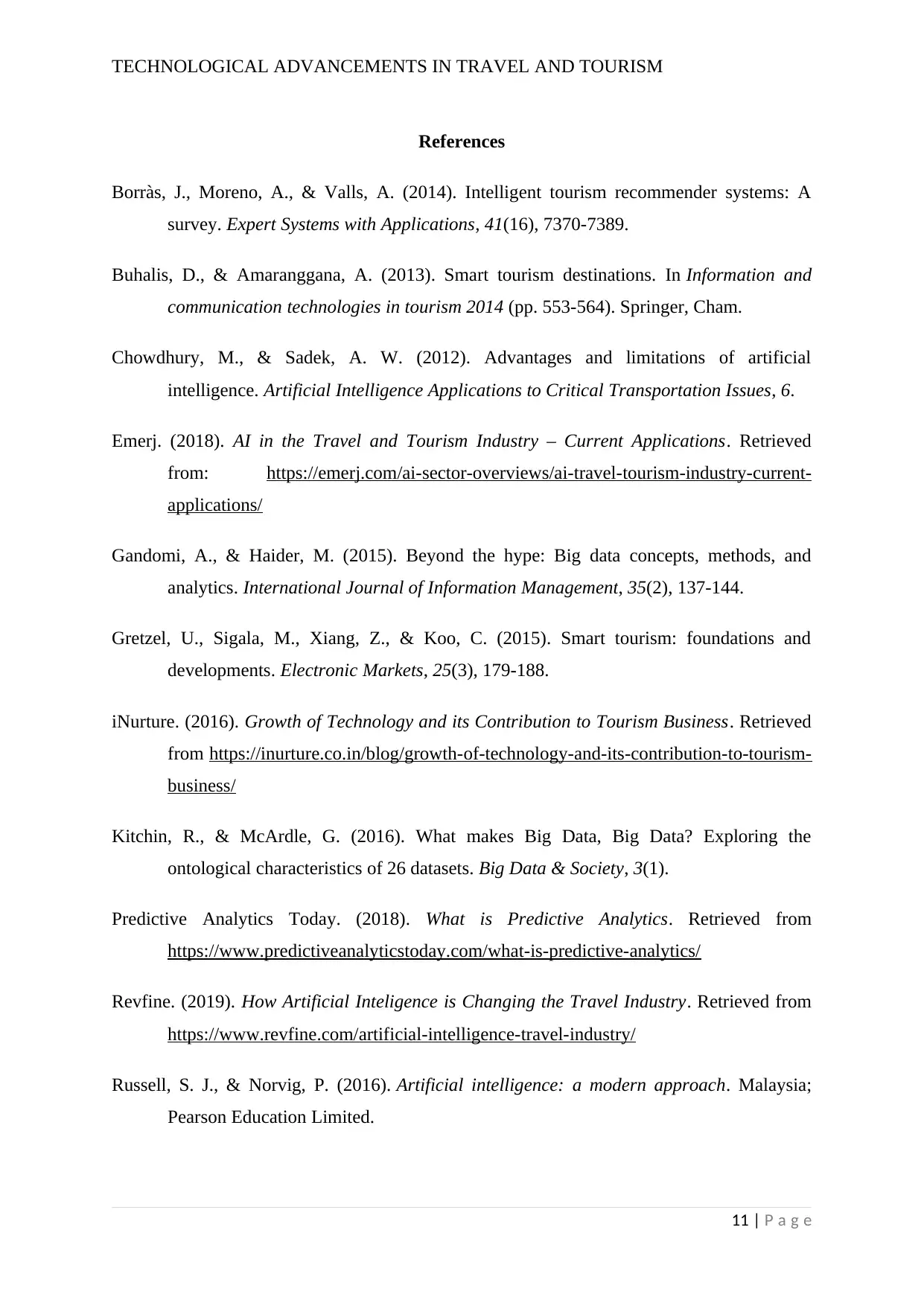
TECHNOLOGICAL ADVANCEMENTS IN TRAVEL AND TOURISM
References
Borràs, J., Moreno, A., & Valls, A. (2014). Intelligent tourism recommender systems: A
survey. Expert Systems with Applications, 41(16), 7370-7389.
Buhalis, D., & Amaranggana, A. (2013). Smart tourism destinations. In Information and
communication technologies in tourism 2014 (pp. 553-564). Springer, Cham.
Chowdhury, M., & Sadek, A. W. (2012). Advantages and limitations of artificial
intelligence. Artificial Intelligence Applications to Critical Transportation Issues, 6.
Emerj. (2018). AI in the Travel and Tourism Industry – Current Applications. Retrieved
from: https://emerj.com/ai-sector-overviews/ai-travel-tourism-industry-current-
applications/
Gandomi, A., & Haider, M. (2015). Beyond the hype: Big data concepts, methods, and
analytics. International Journal of Information Management, 35(2), 137-144.
Gretzel, U., Sigala, M., Xiang, Z., & Koo, C. (2015). Smart tourism: foundations and
developments. Electronic Markets, 25(3), 179-188.
iNurture. (2016). Growth of Technology and its Contribution to Tourism Business. Retrieved
from https://inurture.co.in/blog/growth-of-technology-and-its-contribution-to-tourism-
business/
Kitchin, R., & McArdle, G. (2016). What makes Big Data, Big Data? Exploring the
ontological characteristics of 26 datasets. Big Data & Society, 3(1).
Predictive Analytics Today. (2018). What is Predictive Analytics. Retrieved from
https://www.predictiveanalyticstoday.com/what-is-predictive-analytics/
Revfine. (2019). How Artificial Inteligence is Changing the Travel Industry. Retrieved from
https://www.revfine.com/artificial-intelligence-travel-industry/
Russell, S. J., & Norvig, P. (2016). Artificial intelligence: a modern approach. Malaysia;
Pearson Education Limited.
11 | P a g e
References
Borràs, J., Moreno, A., & Valls, A. (2014). Intelligent tourism recommender systems: A
survey. Expert Systems with Applications, 41(16), 7370-7389.
Buhalis, D., & Amaranggana, A. (2013). Smart tourism destinations. In Information and
communication technologies in tourism 2014 (pp. 553-564). Springer, Cham.
Chowdhury, M., & Sadek, A. W. (2012). Advantages and limitations of artificial
intelligence. Artificial Intelligence Applications to Critical Transportation Issues, 6.
Emerj. (2018). AI in the Travel and Tourism Industry – Current Applications. Retrieved
from: https://emerj.com/ai-sector-overviews/ai-travel-tourism-industry-current-
applications/
Gandomi, A., & Haider, M. (2015). Beyond the hype: Big data concepts, methods, and
analytics. International Journal of Information Management, 35(2), 137-144.
Gretzel, U., Sigala, M., Xiang, Z., & Koo, C. (2015). Smart tourism: foundations and
developments. Electronic Markets, 25(3), 179-188.
iNurture. (2016). Growth of Technology and its Contribution to Tourism Business. Retrieved
from https://inurture.co.in/blog/growth-of-technology-and-its-contribution-to-tourism-
business/
Kitchin, R., & McArdle, G. (2016). What makes Big Data, Big Data? Exploring the
ontological characteristics of 26 datasets. Big Data & Society, 3(1).
Predictive Analytics Today. (2018). What is Predictive Analytics. Retrieved from
https://www.predictiveanalyticstoday.com/what-is-predictive-analytics/
Revfine. (2019). How Artificial Inteligence is Changing the Travel Industry. Retrieved from
https://www.revfine.com/artificial-intelligence-travel-industry/
Russell, S. J., & Norvig, P. (2016). Artificial intelligence: a modern approach. Malaysia;
Pearson Education Limited.
11 | P a g e
⊘ This is a preview!⊘
Do you want full access?
Subscribe today to unlock all pages.

Trusted by 1+ million students worldwide
1 out of 13
Related Documents
Your All-in-One AI-Powered Toolkit for Academic Success.
+13062052269
info@desklib.com
Available 24*7 on WhatsApp / Email
![[object Object]](/_next/static/media/star-bottom.7253800d.svg)
Unlock your academic potential
Copyright © 2020–2026 A2Z Services. All Rights Reserved. Developed and managed by ZUCOL.




